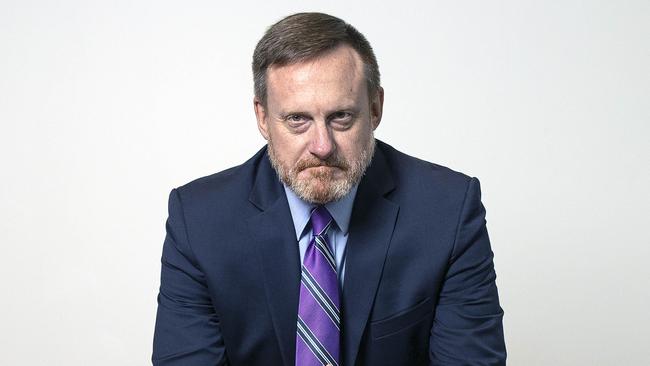AUKUS ‘much more than subs’: ex-US security chief Mike Rogers
The AUKUS agreement could transform Australian hi-tech and defence technology but nuclear-powered subs may take longer than expected, a former US security chief says.

The AUKUS agreement could transform Australian hi-tech and defence technology but nuclear-powered submarines may take longer than expected to produce, former US National Security Agency chief Mike Rogers says.
The retired admiral and senior US intelligence figure – who is visiting Australia this week – suggests Canberra may need to look at interim capabilities before the nuclear subs arrive.
“I think the acquisition of nuclear submarines is powerful, both in its war-fighting capability and in the signals it sends,” Admiral Rogers told The Australian in an exclusive interview. “I applaud Australia’s willingness to make that sort of commitment and to speak about it so frankly.”
However: “Nuclear submarines are incredibly complex platforms. We’re talking about a unit that’s configured for Australia’s needs, it’s not like we’ll just pull a Virginia (class sub) off the production line. Our experience with nuclear-powered submarines is they’re not inexpensive, and often they take longer than you expect. So we must aggressively ask: How can we accelerate this?
“If (you Australians) see the units will arrive late, creating an unacceptable risk, you have to engage the question: Are there alternatives in the interim?”
Admiral Rogers, visiting Australia as part of the advisory board of Cyber-CX, would not be drawn on whether Australia might need new conventional subs as a bridge to the nukes. But he cited the delay in the F35 Joint Strike Fighters, which led Canberra to buy Super Hornets to bridge the gap. He nominated alternative capabilities – “autonomous vehicles, robotics, sensors, situational awareness technologies”. He believes AUKUS is about “much more than submarines”.
The US system is surrounded by bureaucratic walls, dating from when it totally dominated hi-tech fields and wanted to guard its advantage.
“AUKUS represents an agreement to share US technology in the one contemporary war-fighting capability where we believe we still retain clear superiority. So why should the US put restrictions on other things that represent much less risk? We need to use AUKUS to drive change.”
This will have profound economic as well as strategic consequences.
Admiral Rogers nominates quantum computing, artificial intelligence, machine learning, all aspects of cyber, telecommunications networks, optimising data, biomedical developments and nanotechnologies as areas where the US and its allies must have world-best capabilities.
Admiral Rogers was simultaneously head of NSA (under presidents Obama and Trump) and US Cyber Command.
He will address the National Press Club on Friday about cyber lessons from the Russia/Ukraine war. Ukraine has pioneered a new way to build cyber resiliency: “Most people think cyber attack means catastrophic disruption and visible impact,” he said.
In fact, Russia has made massive cyber efforts to disable Ukrainian civilian and military infrastructure. It has mostly failed because of the way Ukraine has mounted cyber defence.
“Ukraine went out to the wider world and said if you have cyber capability and you would like to be a cyber defender, we have a place for you. Ukraine also went to the private sector outside of Ukraine – look at how Microsoft and others have responded.”
Ukrainians understood that the Russians were effective at penetrating and damaging other nations’ cyber systems which have low levels of defence, or static defence systems. Ukrainians constantly change their cyber systems and as a result have produced resilience that neither the Russians, nor the West, foresaw.
Admiral Rogers believes Beijing is studying the Russia/Ukraine conflict closely. If it embarked on an invasion or other military action against Taiwan it would want to achieve a much higher degree of cyber disruption at the start of a conflict.
He says Chinese and Russian approaches to cyber developed differently. The Russians initially used cyber for espionage but also to hit an adversary’s infrastructure. They also invested intensively in using cyber as part of disinformation campaigns within the US and similar societies: “They use social media and our hyper connectivity to divide us.”
China on the other hand focused on using cyber intrusion to gain intellectual property for commercial and defence development, as well as more traditional espionage. It was also focused on cyber military applications. Initially, the Russians were probably technically superior, but the Chinese had more resources.
But the Chinese have become ever better technically, Admiral Rogers says. The West, led by the US, has been singularly ineffective in getting Beijing to reduce any of its cyber offence activities.
“China is not inherently bad or evil. But in cyber, China is engaging in a series of activities which violate international law and refuse to acknowledge accepted international norms.”








To join the conversation, please log in. Don't have an account? Register
Join the conversation, you are commenting as Logout